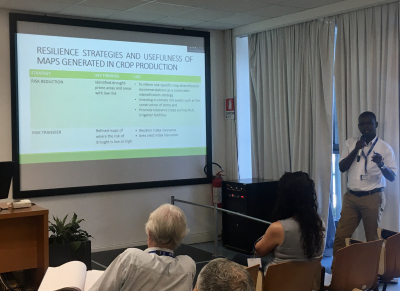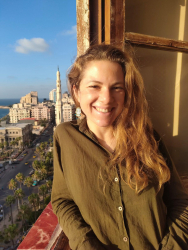


In this series of video interviews, authors present their case studies that IAP recently published in collaboration with Save the Children in 'Climate Change and Health: Science-based Policy Solutions'.
South Africa faces increasing challenges from agricultural droughts, impacting food security and necessitating innovative approaches to manage and mitigate these risks effectively.
Dr. Hillary Mugiyo, a researcher at the Centre for Transformative Agricultural & Food Systems, University of KwaZulu-Natal, spearheaded a study mapping high-risk agricultural drought areas in South Africa. His research focuses on using machine learning to improve drought adaptation strategies, which is crucial for informing policy and decision-making. The study's findings highlight the importance of accurately identifying drought-prone zones to enhance food and nutrition security in the face of increasing climate variability.
Watch the full interview with Hillary Mugiyo to learn more about his impactful work:
Drought Risk Mapping: The study used the Vegetation Drought Response Index (VegDRI), a hybrid drought index integrating the Standardised Precipitation Index (SPI), Temperature Condition Index (TCI), and Vegetation Condition Index (VCI). This tool delineates bioclimatic zones with high rainfall variability and water scarcity, providing a detailed map of drought risk areas.
Machine Learning Integration: A machine learning algorithm, the Classification and Regression Tree (CART) in R and ArcGIS, was utilized to analyse historical satellite climate data and land use/cover maps, generating drought risk maps with high predictive accuracy.
Agricultural Impact Validation: Average sorghum yields at the district level were used to validate the drought maps. The VegDRI demonstrated higher performance in explaining sorghum yields compared to other indices, confirming its reliability for agricultural planning.
Impact and Future Goals: Dr. Mugiyo’s research underscores the critical need for proactive drought management strategies to enhance resilience against climate change. The initiative not only provides valuable tools for policymakers but also supports farmers and communities in adopting sustainable agricultural practices.
Read and download the case study here.
Read and download the entire book here.
Stay tuned for more video interviews from the authors of the IAP Climate Change & Health case studies. Follow us with the hashtag #ClimateHealthSolutions to stay updated on the latest insights and developments.
Watch all the video interviews on the IAP YouTube channel here.
For more information on the project, read here.
